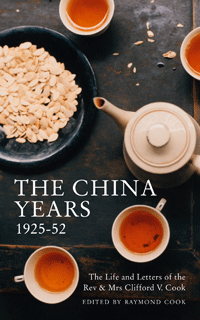
The China
Years
edited by Raymond
Cook
To read an extract of this title click here Reader Review from Amazon.co.uk I have just read this book, which I found difficult to put down. When I started I was a little worried that the letters might dwell too much on personal matters of little interest to readers over half a century later, or that I might be put off by out-of-date religious attitudes. But both these fears proved unfounded – possibly due in part to careful editing.
In 1925, Elsie Cuthbertson (known to all as "Cuth") sailed for China to become a missionary. She met and married Clifford Cook, also a missionary, soon after arriving in China.
Fowever accompanied by a crowd of curious onlookers, she toured her country circuit, teaching the Chinese people about childcare and hygiene, as well as administering medical treatment when needed. Settling into life in China with relatively few mishaps, Elsie married fellow missionary Clifford Cook and the couple remained in China with their young children – surviving Communism Japanese air-raids, anti-Western demonstrations, floods, fires, illness, poverty and hunger – until forced to return to England in 1952 for their own safety.
Raymond Cook is the son of Elsie and Clifford Cook, and was born in China. He has collected the letters his mother and father wrote to make this fascinating book.
292 pp / 198 x 129mm 16 black & white photographs
Price: £8.95 (UK) / $17.95 (USA)
Original Paperback
ISBN: 0 7145 3112 X
September 2005
Reviewer: mariaguagnin from Edinburgh, Scotland *****
The letters flow very easily, maintaining the readers attention, helped by the fact that they cover such a wide range of topics – civil disturbances, floods, famine and disease, evangelism, but above all the daily life of the ordinary Chinese people. Probably the most memorable part of the book concerns the years, during the Second World War when the authors lived under constant danger of Japanese bombing, often having to flee to prevent themselves falling behind advancing Japanese lines. The letters tell in very human terms, at times even humorously, of working with victims of bombing – wounded and bereaved – refugees fleeing the enemy and others plunged into destitution by the horrors of the war.
The early part of the book gives a fascinating insight into the daily life of ordinary, rural Chinese people eighty years ago, even though it is uncompromisingly told from a western view point. It tells, often in a humorous manner, of the difficulties the authors experienced in their early months in coming to terms with a new language and an familiar culture. It also relates occasional and more dramatic events such as anti-foreign riots, when the life of Elsie Cook and her colleagues was in serous danger.
In the post war period the letters tell of optimism as the country, at last at peace, tried to rebuild itself, with the help of substantial foreign aid, only to have everyone’s hopes dashed when the country was once again plunged into civil war as the Communists, under Mao Tse-tung, fought to take control of China.
The final section of the book consists of letters written from Hong Kong by the Rev Clifford Cook where he worked for two years trying to bring some relief and dignity into the lives of the human flood of refugees who poured into the colony after the Communist takeover of the mainland.
Although religious belief may have been the motivating force for the authors the book will appeal to people, like myself, who are not of a religious disposition. Certainly religion comes into it, but so too does the daily life of the people of China, the horrors of warfare and much else besides. Overall it is a fascinating story of adventure, of hardship, bravery and compassion, told without pomp or undue piousness.
